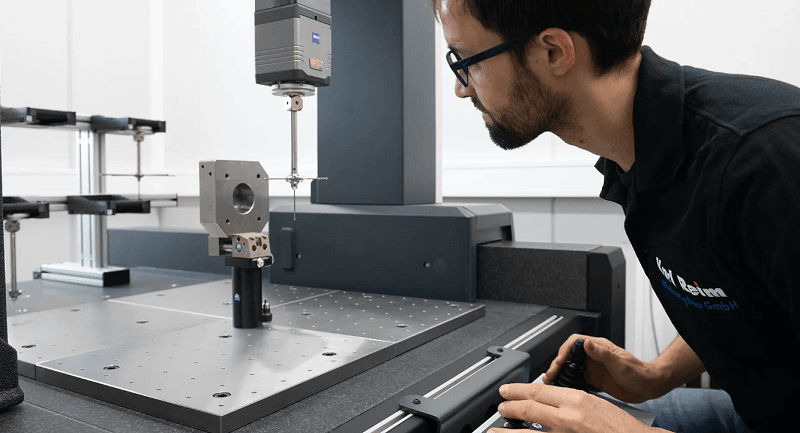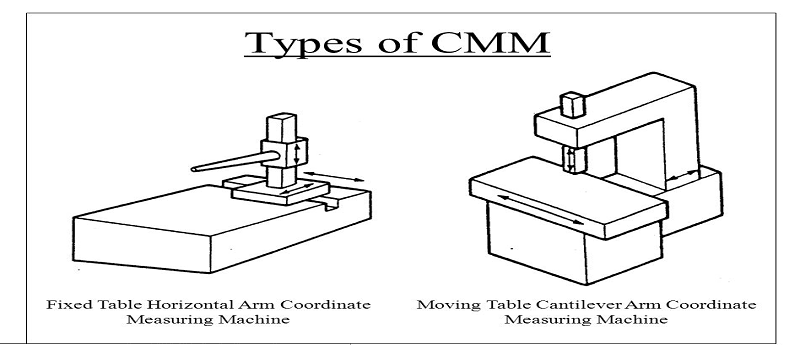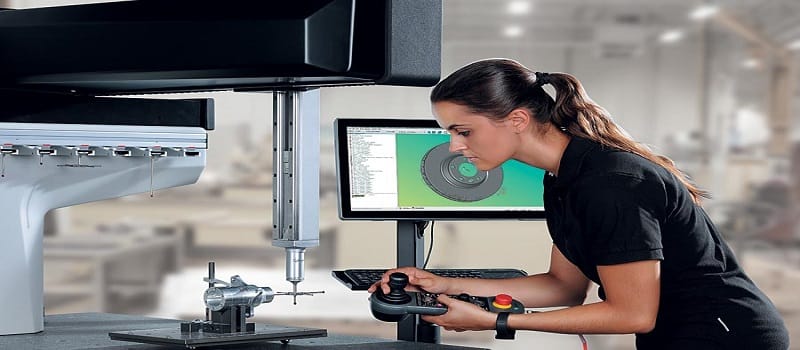In the ever-evolving landscape of manufacturing, precision and accuracy play pivotal roles. One technological marvel that has become indispensable in ensuring these qualities is the Coordinate Measuring Machine (CMM). Let’s embark on a journey to unravel the mysteries behind this fascinating piece of engineering.
Introduction to CMM Machine: Precision Redefined

The Coordinate Measuring Machine, or CMM, stands as a testament to the remarkable strides made in manufacturing and design technology. This sophisticated tool has become a linchpin in ensuring the geometric integrity of objects, reshaping how we approach quality control and inspection procedures.
Definition of CMM
At its core, a CMM is a precision instrument employed in manufacturing and design processes to measure the geometric characteristics of an object. This includes dimensions, angles, and intricate details that define the product. Think of it as the meticulous eye that scrutinizes every aspect of a component, ensuring it adheres to the desired specifications.
Importance in Manufacturing
In the intricate world of manufacturing, precision is not merely a preference; it’s a necessity. Manufacturers across diverse industries, ranging from automotive to aerospace, place their trust in CMMs to uphold stringent quality standards.
The role of CMM machines in maintaining precision cannot be overstated. They are the guardians of quality, ensuring that each product leaving the production line is a testament to accuracy and excellence.
Evolution of CMM Technology
The journey of CMMs has been nothing short of revolutionary. From their humble manual beginnings, where measurements were painstakingly recorded, to their current state of technological prowess, CMMs have evolved significantly.
The integration of advanced features and automation has propelled them from limited applications to becoming integral components of modern production lines.
The evolution has been marked by a shift from manual, time-consuming processes to swift, automated measurements. Today’s CMMs are equipped with cutting-edge technologies that not only enhance precision but also streamline the entire inspection process. This metamorphosis has empowered manufacturers to achieve levels of accuracy and efficiency that were once deemed unattainable.
In essence, the evolution of CMM technology is a testament to human ingenuity and the relentless pursuit of perfection in manufacturing. As industries continue to advance, so do CMMs, standing ready to meet the ever-growing demands for precision and quality assurance.
In the upcoming sections, we will delve deeper into the types of CMM machines, their working mechanisms, applications across various industries, and the advantages they bring to the table. Join us on this exploration of a tool that has redefined the standards of precision in manufacturing.
Types of CMM Machines: Navigating Precision with Versatility

Coordinate Measuring Machines (CMMs) come in various forms, each tailored to meet specific measurement needs and adapt to diverse manufacturing environments. Let’s explore the distinctive types of CMM machines and understand how they contribute to precision in different industries.
1. Bridge CMMs
Overview: These are the traditional stalwarts of CMMs, featuring a stationary design with a bridge-like structure.
Key Attributes:
- Stability: Bridge CMMs are renowned for their stability, making them ideal for applications in large-scale manufacturing where precision is paramount.
- High Precision: The stationary nature of these machines enhances precision, ensuring accurate measurements across a wide range of components.
Applications: Commonly found in industries requiring robust and precise measurements, such as automotive and heavy machinery manufacturing.
2. Articulated Arm CMMs
Overview: If versatility is the key requirement, Articulated Arm CMMs step into the spotlight.
Key Attributes:
- Flexible Arm: Characterized by a flexible arm, these CMMs offer agility in measuring complex geometries.
- Versatility: Ideal for applications where adaptability to intricate shapes and varying surfaces is crucial.
Applications: Widely used in industries like aerospace and mold inspection, where the measurement of complex components is routine.
3. Laser CMMs
Overview: Embracing cutting-edge technology, Laser CMMs redefine precision measurement.
Key Attributes:
- Laser Technology: These CMMs utilize laser beams for measurement, excelling in capturing intricate surface details.
- High Precision Inspection: Ideal for applications where capturing fine details is essential for precise measurements and inspections.
Applications: Thrive in industries such as electronics and medical device manufacturing, where precision at the microscopic level is critical.
4. Portable CMMs
Overview: When flexibility is non-negotiable, Portable CMMs take center stage.
Key Attributes:
- On-the-Go Design: Designed for mobility, allowing measurements to be taken directly on the shop floor or in the field.
- Versatility: Suited for industries that require flexibility in their inspection processes.
Applications: Commonly employed in sectors like construction and shipbuilding, where measurements need to be taken in diverse and dynamic environments.
Understanding the nuances of each type of CMM is crucial for manufacturers looking to invest in precision measuring tools. Whether it’s the stability of Bridge CMMs, the flexibility of Articulated Arm CMMs, the precision of Laser CMMs, or the on-the-go capabilities of Portable CMMs, choosing the right type ensures that the measurement needs of specific applications are met with unparalleled accuracy.
In the subsequent sections, we’ll delve deeper into how these CMM machines work, their applications across industries, and the advantages they bring to the table in ensuring the highest standards of quality control and inspection.
How CMM Machines Work: Unveiling the Precision Process

Coordinate Measuring Machines (CMMs) are marvels of engineering, employing advanced technologies to meticulously measure and inspect objects. Let’s delve into the intricate workings of CMM machines and understand the precision process they follow.
1. Probing Technology
Overview: At the heart of CMMs lies probing technology, which is the method by which data points on the surface of an object are captured.
Key Elements:
- Tactile and Optical Probes: CMMs utilize probes that can be tactile, physically touching the object’s surface, or optical, using non-contact methods like lasers. This diverse probing technology allows for flexibility in measuring various materials and surface types.
Process:
- Tactile Probes: Physically touch the object to record precise data points.
- Optical Probes: Utilize non-contact methods to capture surface details without physical interaction.
Outcome:
- Detailed Digital Representation: The collected data points create a detailed digital representation of the object’s surface, capturing even the minutest features.
2. Coordinate Systems
Overview: To make sense of the collected data in a three-dimensional space, CMMs rely on coordinate systems.
Key Elements:
- XYZ Coordinates: CMMs use a three-dimensional coordinate system, with X, Y, and Z representing the spatial dimensions. This system helps map the points captured by the probing technology.
Importance:
- Accurate Measurements: Understanding the coordinate system is crucial for accurate measurements, providing a standardized framework for positioning and mapping.
Outcome:
- Comprehensive View: The XYZ coordinates offer a comprehensive view of the object’s structure and dimensions.
3. Data Collection Process
Overview: With data points acquired, the CMM’s probe systematically collects information across the object’s surface.
Key Elements:
- Systematic Measurement: The probe moves methodically, capturing data points in a systematic manner to ensure thorough coverage.
Advanced Software Processing:
- Dimensional Analysis: Advanced software processes the collected data, performing dimensional analysis to generate detailed reports.
- Deviations and Tolerances: The software calculates deviations from the intended dimensions and assesses tolerances to determine the object’s conformity to specifications.
Outcome:
- Detailed Reports: The processed data translates into detailed reports, providing insights into the object’s dimensions, potential deviations, and adherence to specified tolerances.
Understanding how CMM machines work is pivotal for appreciating their role in precision measurement and quality control. In the subsequent sections, we’ll explore the applications of CMM machines across various industries and the advantages they bring to the manufacturing landscape.
Applications of CMM Machines: Precision Unleashed

Coordinate Measuring Machines (CMMs) have become indispensable tools in various industries, offering unparalleled accuracy and efficiency in diverse applications. Let’s delve into the key applications of CMM machines, showcasing their pivotal role in manufacturing.
1. Quality Control in Manufacturing
Overview: CMMs serve as guardians of quality, ensuring that every manufactured component meets stringent standards.
Key Elements:
- Precision Measurements: CMMs provide precise measurements, minimizing variations and deviations from specified dimensions.
- Defect Reduction: By detecting and addressing deviations early in the manufacturing process, CMMs contribute to the reduction of defects in final products.
Impact:
- Enhanced Overall Product Quality: The meticulous quality control facilitated by CMMs results in products of superior quality, meeting or surpassing industry standards.
2. Reverse Engineering
Overview: CMMs are instrumental in the reverse engineering process, where existing components are analyzed to create digital models.
Key Elements:
- Data Capture: CMMs capture detailed data points on existing components.
- Digital Modeling: The collected data is used to create accurate digital models for further analysis and reproduction.
Applications:
- Component Reproduction: Industries leverage CMMs to replicate existing components with precision.
- Design Analysis: The digital models generated through reverse engineering enable in-depth design analysis.
Impact:
- Innovation and Replication: Reverse engineering with CMMs fosters innovation by understanding existing designs and allows for the replication of components with high accuracy.
3. Inspection of Complex Geometries
Overview: In industries where intricate designs are prevalent, such as aerospace, CMMs excel in inspecting and verifying complex shapes.
Key Elements:
- High Accuracy: CMMs provide the level of accuracy required to inspect intricate and complex geometries.
- Comprehensive Coverage: The systematic data collection process ensures thorough inspection of every aspect of complex shapes.
Applications:
- Aerospace Components: CMMs are extensively used to inspect and verify the intricate designs of components in the aerospace industry.
- Tool and Die Manufacturing: In sectors requiring precision tooling, CMMs play a crucial role in inspecting complex dies and molds.
Impact:
- Ensuring Precision in Critical Industries: CMMs contribute to maintaining precision and quality in industries where even the slightest deviation can have significant consequences.
In essence, the applications of CMM machines extend beyond mere measurement. They are enablers of innovation, guardians of quality, and crucial assets in industries that demand precision and accuracy. In the following sections, we’ll explore the advantages CMM machines bring to the table and their impact on diverse manufacturing processes.
Advantages of CMM Machines: Redefining Precision in Manufacturing

Coordinate Measuring Machines (CMMs) stand at the forefront of technological advancements in manufacturing, offering a myriad of advantages that elevate precision and efficiency. Let’s delve into the key advantages that make CMMs indispensable assets in the manufacturing landscape.
1. Precision and Accuracy
Overview: The bedrock of CMMs is their unparalleled ability to deliver measurements with precision and accuracy.
Key Elements:
- Exact Specifications: CMMs ensure that products meet exact specifications by providing measurements with microscopic precision.
- Minimized Variations: The high level of accuracy minimizes variations, contributing to the production of components that adhere strictly to predetermined dimensions.
Impact:
- Quality Assurance: The precision and accuracy of CMMs play a pivotal role in quality assurance, reducing defects and ensuring that every product leaving the production line is of the highest quality.
2. Time and Cost Efficiency
Overview: The integration of automated processes in CMMs brings forth significant advantages in terms of time and cost efficiency.
Key Elements:
- Automated Inspections: CMMs streamline the inspection process through automation, reducing the time required for measurements.
- Operational Cost Savings: The efficiency of automated CMM processes translates into operational cost savings for manufacturers.
Impact:
- Accelerated Production Cycles: Automated CMM processes contribute to shorter production cycles, allowing manufacturers to bring products to market faster.
- Cost-Effective Operations: Reduced inspection times and increased efficiency result in cost savings, enhancing the overall economic viability of manufacturing processes.
3. Non-Destructive Testing
Overview: CMMs introduce a non-destructive approach to testing, preserving the integrity of components.
Key Elements:
- Preserving Component Integrity: CMMs allow for non-destructive testing, ensuring that components remain intact during the inspection process.
- Minimizing Waste: By avoiding destructive testing methods, CMMs contribute to minimizing waste in manufacturing.
Impact:
- Sustainable Practices: Non-destructive testing aligns with sustainable manufacturing practices, reducing the environmental impact of production processes.
- Preserving Valuable Components: CMMs enable thorough inspections without compromising the structural integrity of valuable components.
In conclusion, the advantages of CMM machines extend far beyond precise measurements. They redefine efficiency in manufacturing, offering a strategic blend of accuracy, speed, and sustainability. As we continue to explore the intricacies of CMM technology, we’ll delve into its limitations, industry-specific examples, and future trends that promise to further enhance its capabilities.
Considerations for Choosing a CMM

In the realm of manufacturing, the choice of a Coordinate Measuring Machine (CMM) is a critical decision that directly impacts the quality and efficiency of the production process. Selecting the right CMM involves a thoughtful consideration of various factors. Let’s delve into the key considerations for choosing a CMM that aligns seamlessly with specific industrial needs.
Application-Specific Requirements
When it comes to CMM selection, one size does not fit all. Different industries and applications have distinct measurement needs, and understanding these requirements is paramount. Here’s why:
a. Precision Demands
Different applications require varying levels of precision. For instance, the precision needed in aerospace components may differ from that in automotive parts. Understanding the specific precision demands of the application ensures the chosen CMM can deliver accurate measurements.
b. Dimensional Complexity
Some applications involve intricate geometries and complex shapes. Choosing a CMM that can effectively measure and inspect these dimensional intricacies is crucial for maintaining quality standards.
c. Material Considerations
The type of material being measured plays a significant role. CMMs must be equipped to handle the materials prevalent in the industry, whether it’s metals, plastics, or composites.
d. Industry Standards
Different industries adhere to specific standards and regulations. Ensuring that the chosen CMM complies with these standards is vital for quality assurance and regulatory compliance.
Budget Constraints
While precision and capabilities are essential, manufacturers operate within budgetary constraints. Balancing the features of a CMM with budget considerations is a delicate but necessary task. Here’s why:
a. Cost-Effectiveness
Assessing the cost-effectiveness of a CMM involves not just the initial purchase cost but also factors like maintenance, calibration, and operational expenses over its lifespan.
b. Return on Investment (ROI)
A CMM should not be viewed solely as an expense but as an investment. Calculating the potential ROI based on increased efficiency, reduced defects, and improved product quality helps justify the expenditure.
c. Scalability
Consider the scalability of the CMM system. Will it accommodate future growth and technological advancements without requiring a complete overhaul? Scalability is crucial for long-term cost-effectiveness.
Training and Support
Even the most advanced CMM technology is only as good as the personnel operating it. Proper training and ongoing support are integral aspects of maximizing the benefits of CMM technology. Here’s why:
a. Operator Proficiency
CMM operators need adequate training to harness the full potential of the machine. Proficient operators can navigate the software, troubleshoot issues, and optimize the CMM’s performance.
b. Maintenance Training
Regular maintenance is key to ensuring the longevity and accuracy of CMMs. Training personnel in proper maintenance procedures helps prevent downtime and costly repairs.
c. Manufacturer Support
Choosing a CMM from a manufacturer that provides robust support is essential. Timely software updates, technical assistance, and readily available spare parts contribute to the overall reliability of the CMM.
In conclusion, the considerations for choosing a CMM extend beyond its technical specifications. A holistic approach that accounts for application-specific needs, budget constraints, and ongoing support ensures that the selected CMM becomes a valuable asset in the manufacturing arsenal, contributing to enhanced product quality and overall operational efficiency.
FAQs About CMM Machine

What industries benefit the most from CMM technology?
CMM technology finds significant applications in industries such as automotive, aerospace, and medical device manufacturing.
Are CMM machines suitable for small-scale production?
Yes, CMM machines are versatile and can be adapted for use in small-scale production, providing benefits in precision and quality control.
Do CMM machines require constant calibration?
Regular calibration is essential to ensure the accuracy of CMM machines. However, the frequency may vary based on usage.
How difficult is it to learn and operate a CMM machine?
While there is a learning curve, with proper training, operating a CMM machine becomes manageable, and skilled personnel can utilize its full potential.
What is the typical lifespan of a CMM machine?
The lifespan of a CMM machine depends on factors such as usage, maintenance, and technological advancements. With proper care, they can last for many years.
Conclusion
In conclusion, CMM machines represent more than just measurement devices; they embody a commitment to excellence and a drive for innovation. As industries continue to advance, the role of CMMs in shaping the future of manufacturing remains pivotal.
Whether it’s ensuring precision in complex geometries, contributing to sustainable practices, or fostering innovation through reverse engineering, CMM machines continue to be at the forefront of technological progress.


